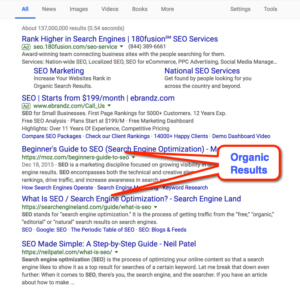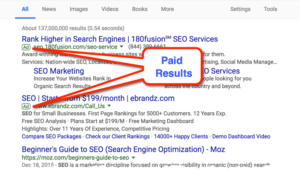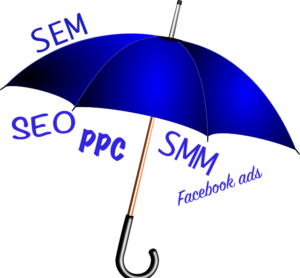We have all heard of SEO (Search Engine Optimization) and some of us have implemented its strategy and tactics. But what about SEM?
What is the difference, and why should we consider it in our plan. Which is better, SEO or SEM?
Search engine optimization is the building block so let's start there. I am amazed at why this process is still so misunderstood and clients are still so confused by it. I think it has a lot to with the fact that SEO is so intangible. It's there and we all have to pay close attention to it, but many still have no idea what it's doing.
In a nutshell, SEO is the method of optimizing your website to be search engine friendly driving organic or natural traffic from the search engine result pages. Those visitors who click through and land on your page is what it is all about.
When you search for a product or service, you get a results page. This list is based on keywords, content, and site structure of your site and how it matches up to the search. The goal? To rank high in the results so they see your company in the first page or so. Easy concept, challenging task. This is where the organic results term you might have heard of comes from. No one paid for that placement, it's just good SEO. Below is an example of organic results for a search.
There are two forms of SEO, On-Page and Off-Page
On-Page SEO tactics:
- Optimize: Is the site designed for responsive screens (mobile and tablets)? How is the the page load speed. Visitors are impatient-we won't wait long
- Blog: Keep your blog posts current (post as often as your can-nothing more of a downer than a stale ignored website
- Meta Data: Incorporate keyword naturally throughout not only the content but also in your meta data. Look at your meta descriptions, title tags, heading tags, alt text, and the like
- Page URLs: Keep them clean and formatted properly
- Social sharing: Make it easy for visitors to tell the world with social integration within your content
Many think of SEO only in the On-Page strategy, but Off-Page should not be over looked. Here are a few tactics to consider. It's a little more challenging as it requires more work, but can provide great results. Why would this help results? If a topic drives a visitor to another site, and they click on a link to yours… uhm that's a good result! I won't dwell on it, but here are a few thoughts to consider.
Off-Page SEO tactics:
- Backlinks: Have authoritative or high quality sites link back to yours, Creating a natural backlink profile can have a profound effect of visitors and results
- Social Sharing: The use of Social Media Marketing, or having other platforms drive traffic and search results back to your site
- Social Bookmarking (Digg, Stumbleupon, Reddit)
So what is SEM? Search Engine Marketing is a form of Internet marketing that involved the promotion of websites by increasing their visibility in search engine results pages (SERPS) through optimization and advertising. thanks Wikpedia.
The main difference here is SEM, generally speaking, is paid for.
Note the search below and the little “Ad” icon to the left (that appear at the Top of the page). Wasn't by accident.
SEM is usually driven by PPC (Pay per click). This could be through a search engine itself (Google, Bing) or through Social Media (Facebook, Youtube…) or a website your are visiting. Essentially, you are buying ad space on the search engine results page. How much you pay is where you rank.
Why would you pay for clicks? After all, your site is awesome! Well, let's just say, your site is new. Or maybe you are just starting out on your SEO journey. maybe using this tactic could drive more visitors to your site while the SEO takes effect (it is a journey-not a race). Since it takes time for SEO to take hold, SEM might be a way to jump start activity. It;s like an umbrella covering many tactics.
Targeting might be another reason. With PPC, you can drill down to specific searches and weed out those on the fringe.
In the end, SEO is a must. SEM can be a stop gap while you are building your credibility. Once you evaluate if the cost justifies, it may be an option to add to your marketing toolbox.









